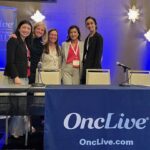October is Breast Cancer Awareness Month. Breast Cancer and Research Virginia Cancer Specialists
 Just a few decades ago, little was known about breast cancer. It was a rarely talked about disease. Today, breast cancer is in the news almost daily, and much of what we read and hear involves breakthroughs in early detection, new drug therapies and the latest treatment techniques.
Just a few decades ago, little was known about breast cancer. It was a rarely talked about disease. Today, breast cancer is in the news almost daily, and much of what we read and hear involves breakthroughs in early detection, new drug therapies and the latest treatment techniques.
Thanks to the hard work and dedication of researchers, scientists, pharmacologists, oncologists and other healthcare providers, we have made significant progress in terms of what we know about breast cancer, its diagnosis, its treatment and most importantly, its prevention. We have made – and continue to make – dramatic advances that save lives.
While the progress we have made is commendable, we still have a long way to go. Breast cancer is the most common cancer in women. This year alone, 252,710 women will be diagnosed with breast cancer and 40,610 women will lose their lives to the disease.
While these statistics are staggering, there is a positive trend to report. Death rates from breast cancer have begun to decline, likely because of earlier detection through screening and improved treatment. That’s why increasing breast cancer awareness is so important.
As you may know, the month of October is recognized as National Breast Cancer Awareness Month. During this month and throughout the year, we strive to educate women about breast cancer and encourage them to follow the recommended guidelines for screening. This includes yearly mammograms starting at age 40. Women should also know how their breasts normally feel and report any change promptly to their healthcare providers. Women with family history, genetic tendency or past breast cancer should speak with their healthcare provider about starting mammography screening earlier, having additional tests or having more frequent exams.
Encouraging women to be screened regularly and consistently for breast cancer is a critical step in helping decrease death rates even further. Another important goal is increasing our knowledge of breast cancer through extensive laboratory research and detailed clinical trials. This scientific data will help us better understand what works, how it works and how to make it work better.
At Virginia Cancer Specialist research is a key component of our mission, and our oncologists participate in a number of important clinical trials. Through our affiliation with The US Oncology Network, Virginia Cancer Specialists is able to bring some of the newest promising cancer therapies to patients, giving them opportunities to participate in ongoing cutting-edge clinical research and development.
Our participation in this research not only helps us increase knowledge about breast cancer, but it also brings the latest therapies directly to patients in the community where they live and work. We have and continue to participate in many important trials, including the pivotal trials that got trastuzumab , palbociclib and ribociclib approved. We are currently excited about immunotherapy trials both in the adjuvant and the metastatic setting, multiple ground-breaking trials for women with metastatic disease and CDK4-6 inhibitors in the adjuvant setting. These are important and exciting trials that will likely dictate how we treat patients in the future.
Learn More about Breast Cancer Here.
Anne Favret M.D. is a Medical Oncologist with Virginia Cancer Specialists

 Just a few decades ago, little was known about breast cancer. It was a rarely talked about disease. Today, breast cancer is in the news almost daily, and much of what we read and hear involves breakthroughs in early detection, new drug therapies and the latest treatment techniques.
Just a few decades ago, little was known about breast cancer. It was a rarely talked about disease. Today, breast cancer is in the news almost daily, and much of what we read and hear involves breakthroughs in early detection, new drug therapies and the latest treatment techniques.




